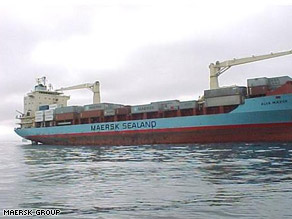
David McKenzie
CNN Africa Correspondent
I have been covering Somali piracy for over a year, sailed with the USS Shoup patrolling the waters off Somalia searching for bands of marauders, and interviewed merchant sailors who had been held for months.
But nothing compares to this.
Pirates brazenly attacking a giant US flagged container ship off the coast of Somalia carrying food aid. In the ensuing fight the crew took back the ship, but the pirates made off with their captain in a lifeboat.
In his desperation to escape from his Somali Pirate captors, Captain Richard Phillips tried to escape from pirates on Thursday night by diving off the lifeboat where he was being held to swimming for the nearby US warship, said U.S. officials. The pirates hauled him back.
It was a brave attempt to get loose from his captors who are now trying to spirit him to the lawless Somali shore, according to a source well-connected to the Somali pirate scourge.
“The pirates have at least three hijacked boats heading towards the scene, ”the source told me, “that means that as many as four hijacked vessels carrying more than 50 hostages are heading towards the lifeboat.”
The pirates’ strategy is to use these boats as a human shield and to provide cover for dash to the mainland, he said.
Piracy has been around the years, but this incident raised the stakes. First, the pirates took on an American flagged ship with American sailors in a region patrolled predominately by US warships. Second, there is a new administration in charge in Washington and they can’t be seen as doing nothing. Though President Obama has so far refused to comment.
Until now, nothing is precisely what the Navy has been doing once ships or individuals are taken hostage by pirates. They feel it is the safest option.
The coalition Navy that takes on pirates-dubbed CTF-151-has a strict policy. If a boat is under attack and they are in the vicinity then they will intervene. If pirates successfully take a ship then they will ‘observe’ and ‘monitor’ the boat, but they will not intervene. There is too much risk to the hostages, they say. In ships with particularly precious cargo, such as the MV Faina, a hijacked boat packed with weapons, they will encircle the ship to ensure that the cargo doesn’t get to the lawless mainland of Somalia.
Hostage situations can be dangerous. In a rescue operation of a hijacked yacht today off the Somali coast, a French hostage and two pirates died, according to the French president’s office. Four hostages were freed, including one child. The French military carried out the operation.
I have witnessed the French forces completing a classified drill to free hostages off the coast of Djibouti. And though their operations and training are impressive, anything can go wrong out at sea.
There have also been some reporting that suggests that it can be legally complicated taking on a ship. This is not the case. Piracy is covered by international law and well worn precedent. The act of piracy is considered a “crime against humanity” and any military vessel can take on pirates on a ship they have hijacked and they can be tried in any court “in good standing”. Both America and the UK have signed agreements to have pirates tried in Kenyan courts.
There is also several UN security council resolutions that allow for the coalition forces to strike against pirates both in international and Somali waters and a special resolution allowing them to follow pirates “in hot pursuit” onto the mainland.
But most analysts feel that they are unlikely to do so. The “black hawk down” incident of the early nineties has made western forces very wary of putting boots on the ground in Somalia. And the pirates know this. They will try to get Captain Phillips to shore as soon as possible. Barring this, they could transfer him to another ship with hostages, further complicating the possibilities for the FBI or the US Navy.
Pirates are after one thing and one thing only: money. They haven’t generally harmed hostages-in fact there is a whole industry on the shores of Somalia to raise animals to feed hostages and keep them relatively healthy during long ransom negotiations. Money is usually paid by the shipping company and it can run into the millions of dollars.
And this should be a small comfort to the family of Richard Phillips and to the families of so many others held hostage off the coast of Somalia tonight.
But until ransoms stop, piracy will continue unabated.
